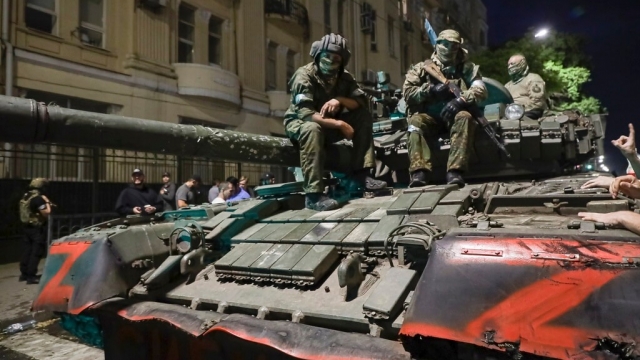In a stunning turn of events in the Russia-Ukraine war, a Russian mercenary group that had been fighting in Ukraine orchestrated a rebellion against Russia itself this weekend, posing a significant threat to President Vladimir Putin's more than two-decade-long rule.
What exactly happened?
It all started on Friday, when the leader of the Wagner Group, Yevgeny Prigozhin, vowed to retaliate against the Kremlin after making serious allegations against Russia's military, accusing them of launching a devastating assault on a Wagner camp, resulting in the loss of a significant number of his troops.
Within the span of 24 hours, the group—a military contractor popularly known as Putin’s shadow army—abruptly withdrew its forces from Ukraine, seized control of a crucial military installation situated in the southern Russian city of Rostov-on-Don, and then continued to advance to within 120 miles of Moscow.
This group emerged in 2014 in Ukraine, helping the Russian military seize Crimea and destabilize the eastern Donbas region, and since then has reportedly been involved in a range of global conflicts from Syria to Libya to Mali, usually assisting Russia's military or Russian political interests.
And while the mercenary forces reached the Russian cities without resistance, this revolt didn't last long.
SEE MORE: Who is Yevgeny Prigozhin, the man calling for a revolt against Russia?
The brokered deal
On Saturday, Prigozhin made a surprising decision to order his troops to halt their advance and return to Ukraine, alleging that the main reason for the halt was to avoid shedding more Russian blood.
However, the Kremlin later announced that a deal brokered by Belarusian President Alexander Lukashenko was responsible for ending the insurrection.
Putin had vowed harsh punishment to those who took part in the armed rebellion, stating that the uprising was "a stab in the back" and "treason."
However, under the negotiated agreement, Prigozhin will be exiled to Belarus without facing criminal charges. Additionally, charges against the troops who joined him to form the armed rebellion will be dropped, and those who did not partake in the rebellion will be offered contracts by the Russian Defense Ministry.
This development demonstrates Lukashenko's growing influence in regional affairs and his ability to impact the dynamics of the Russian regime. The involvement of Belarus suggests that neighboring countries may play a crucial role in shaping events that challenge Putin's rule.
What happens next?
This marks a historic turning point in Putin's rule, presenting a substantial challenge to his authority and revealing cracks in the once seemingly impervious facade of his regime.
Just 16 months ago, Russian forces were on the verge of capturing Ukraine's capital, Kyiv, with the belief that they could swiftly erase the country from the map. However, the sudden need to defend Moscow against Putin's own mercenaries has forced a dramatic shift in priorities, underscoring the gravity of the situation for the Russian government.
Russia's lower house of parliament is now working on a new law to regulate the Wagner Group, according to CNN.
The head of Russia's Defense Committee, Andrey Kartapolov, told a Russian business newspaper that the fate of the mercenary group remains unclear but that there's no need to ban the group since it's a combat-ready unit.
"There are questions for its leadership, and not for the fighters," Kartapolov said.
While the full implications of these events remain uncertain, it is evident that Russia is now grappling with extraordinary circumstances.
The world is watching
The group's march towards Moscow sent shockwaves through the world, bringing to the forefront questions about Russia's internal stability and the potential consequences for its international relations.
While the situation remains fluid, with the outcome yet to be determined, the immediate focus will undoubtedly be on ensuring Moscow's security, but the repercussions for Russia's internal dynamics as well as its relations with other nations cannot be overlooked.
The escalation between the Wagner Group and the Kremlin drew callsbetween President Joe Biden and French President Emmanuel Macron, German Chancellor Olaf Scholz, and British Prime Minister Rishi Sunak on Saturday. In those calls, the nations all "affirmed their unwavering support for Ukraine."
Meanwhile, U.S. Secretary of State Antony Blinken said during a CNN interview on Sunday that as the situation continues to unfold, there is a growing possibility that it could present an advantageous opportunity for Ukraine as it undertakes a strategic counteroffensive.
"To the extent that Russia is now distracted that Putin has to worry about what's going on inside of Russia, as much as he has to worry about what he's trying to do not successfully in Ukraine, I think that creates an additional advantage for the Ukrainians to take advantage of," Blinken said. "Any time you have a major country, like Russia, that has signs of instability, that’s something of concern. That’s something that we’re very focused on. When it comes to their nuclear weapons, we’ve seen no change in their posture, and we’ve made no change in our own posture."
Ukrainian President Volodymyr Zelenskyy took to Twitter to say this whole situation was "complete chaos."
"The world saw that the bosses of Russia do not control anything. Nothing at all. Complete chaos. Complete absence of any predictability," Zelenskyy said. "The longer your troops stay on Ukrainian land, the more devastation they will bring to Russia. The longer this person is in the Kremlin, the more disasters there will be."
Trending stories at Scrippsnews.com



